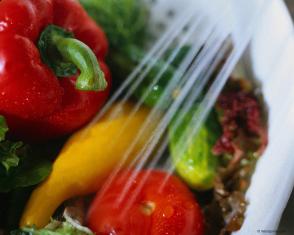Top ServSafe MN Tips for Preventing Food-Borne Illness from Raw Fruits and Vegetables
Earlier this week, foodsafteynews.com reported that a recent e-coli incident has been linked to raw cucumbers. Those who have studied ServSafe in MN know that incredible care must be taken with meats, dairy and eggs in order to prevent food borne illness, but potential issues with raw fruits and vegetables are frequently overlooked.
Tips for Preventing Food-Borne Illness from Raw Fruits and Vegetables
The first step in preventing the spread of food-borne illness is to wash raw produce. It may be easy to simply cut fruits and  vegetables such as tomatoes, cucumbers and oranges that appear to be ready for preparation, but just because something looks clean and ready to eat does not necessarily mean that it is. Invisible remnants of soil, fertilizer or other contaminates may still exist on the surface.
vegetables such as tomatoes, cucumbers and oranges that appear to be ready for preparation, but just because something looks clean and ready to eat does not necessarily mean that it is. Invisible remnants of soil, fertilizer or other contaminates may still exist on the surface.
There are certain fruits, such as melons and tree fruits, in which the rind is not eaten. Those should still be washed or peeled before serving. There have been cases where food-borne illness has spread from bacteria on the rinds of melons or citrus fruits. Bacteria can be spread by a lemon that is sliced and used as a garnish in a glass of water or from a slice of cantaloupe in which the knife used to slice it has picked up contaminates from an unwashed peel.
Common Raw Fruits and Vegetables that Cause Food-Borne Illness
While any raw fruit or vegetable can cause food-borne illness, and steps learned in ServSafe MN should be used to prevent tainted food from reaching customers, there are a few specific items that should be given extra care.
- Sprouts
- Melons
- Leafy greens
- Root vegetables
Sprouts have become such as hazard for food-borne illness that many restaurants and stores have stopped selling them. Special attention should be taken before serving uncooked sprouts to ensure that they have been thoroughly cleaned.
Melons, especially cantaloupe, have been a notorious hazard in recent years. The rugged rind of the cantaloupe can shelter bacteria from a quick wash.
Leafy greens and root vegetables grow in or very near the soil, and thus have more contact with dirt, natural and chemical fertilizers and other contaminates. Any of these items should be thoroughly washed, and root vegetables that are to be served raw, such as carrots, should be washed before they are peeled to prevent bacteria from contaminating preparation utensils.
Safe Food Training schedules regular food manager certification MN and re-certification courses at several convenient locations around the Twin Cities.


